Football Manager 2024 plugs feature holes for the strongest release in a long time
Perhaps obviously, Football Manager is back, and equally obviously, Football Manger 2024 is better than ever. Of course, whether it’s good or not isn’t the question, the question is how much better it is.
I’m over a season into Football Manager 2024 and my experience is very similar to how it was last year when I played it via Apple Arcade, and the year before where I sunk a little over 800 hours into it on PC. In fact, through the misty fog of nostalgia and memory, they’ve all been quite similar in practice, right?
Of course, the experience is going to be similar, it’s not like Sports Interactive are going to reinvent the concept of football in the same fashion that shooters or racing games might — while I do think that a quick QTE battle between managers as part of the pre-match press circuit could be a laugh, it’s hardly in the spirit of things. However, it’s always easy to think of ways that the next iteration can improve, something that’s a lot trickier than most pundits might imagine, not least because I bet there’s a lot of code debt tangled up in that two-decades-long, iterative design system.
With that said, it must have been a harder year than most, what with the full engine shift looming with Football Manager 2025 and the inevitable need to make sure this didn’t just look like filler while a large percentage of the team squirrels away at porting and recoding the series’ core.
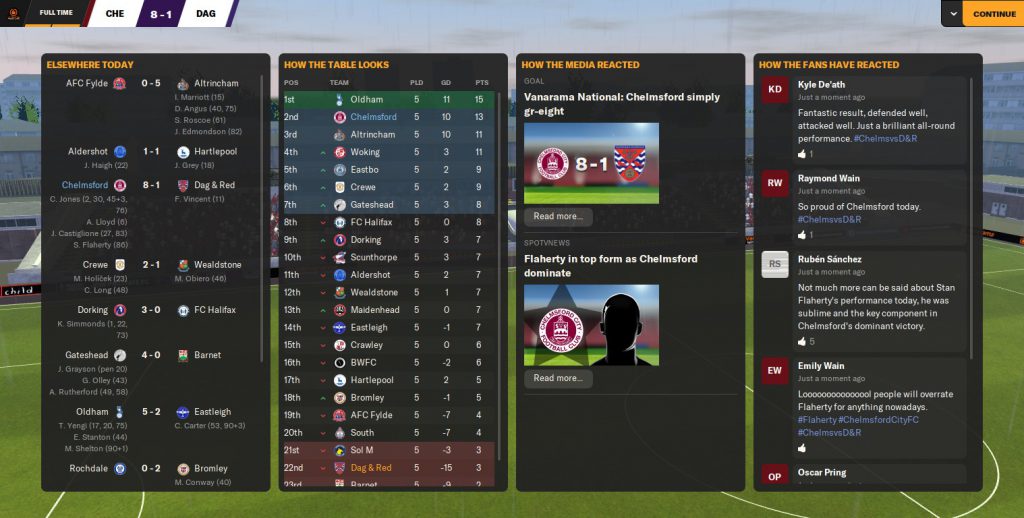
There are changes though, plenty of them. For a start, vampires have been buffed — that’s right, agents are chattier and (for me at least) more disruptive than ever. Intermediaries are in too, which feels like a great addition alongside increased activity from agents. The squad planner feels a bit more refined, and extends to international teams, but that might be something I’m spotting more because tactical roles feel much better realised — the addition of IFBs has had me tinkering with my team roles a lot more this time around. There are plenty more other feature changes too, which you’re probably well aware of, so I’m going to break the rest of this review down into the change in feel, and the change in systems, as I perceived them.
Before I start though, I should clarify that my Football Manager playthrough plan is always to take a lower-league Essex side — Harlow, if the leagues extend that low, but more recently Bishop’s Stortford or Chelmsford — and then run the gambit with them. Lower-league play works great for me because my actual footballing knowledge is far below average and because it gives me a couple of seasons to figure out new features before I’m normally poached for some high-league club, fail miserably and end up finding another sixth-tier team to commandeer.
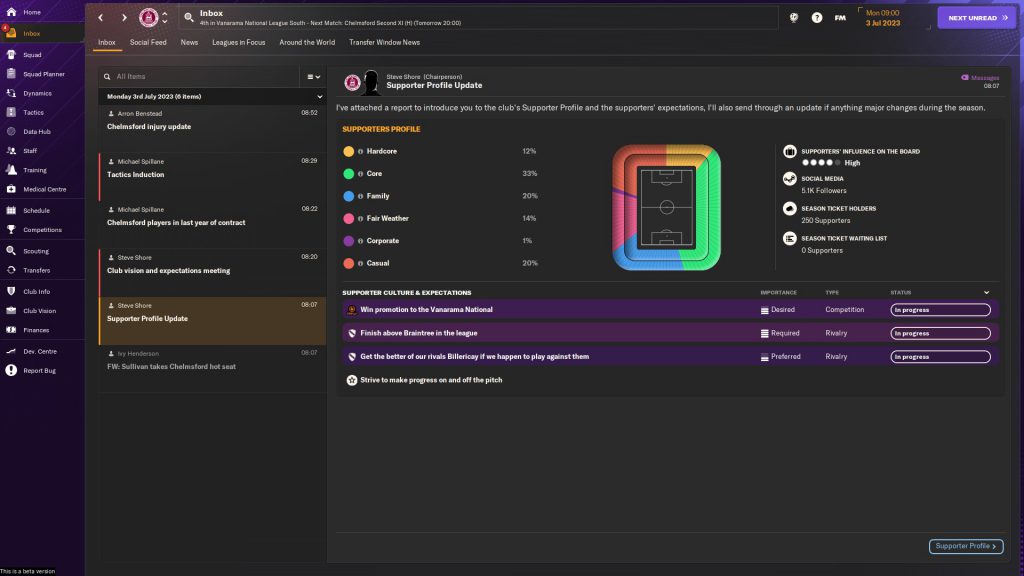
The change in feel
As I said earlier, while there might not be a stack of major changes on paper, the changes that have come have helped things click together a bit better. Adding in the ability to set up players as Inverted Full Backs might seem minor, but opened up a whole bunch of new strategies regarding wing-play or other playstyles.
The reason this has had such deep repercussions is that normally defenders get the rough end of the stick for pre-fab roles, joining AMC and GK in the five-or-less options category. This changes that, and allows for some sneaky, fast-moving plays; And that, that sent me off to investigate features of the game that I normally leave to my assistant manager.

A result of having more options at each of the three primary rows of play means that tactics, team instructions and player-specific roles feel more important. It feels a lot more responsive when you switch out the role of an outer defender because your rivals are playing down the wings. It also means that the assistant manager feels a little bit more like a tiny devil on your shoulder, tempting you to break from your careful plan. Historically I’ve bent my will to their suggestions, however with Football Manager 2024, more time spent in personal instructions, the squad planner and tinkering with training has meant that I’ve been sticking with my plans rather than tinkering.
It’s also meant that rather than switching between two or three, hard-tactical swaps, I’m tweaking roles to match subs and injuries, rather than barging my way through the instructions screen or completely reconstructing tactics. This, resultingly, means that there’s more of a drive to pull in people for specific roles rather than positions — there’s just something different that I can’t quite put my finger on that quite pulls things together.
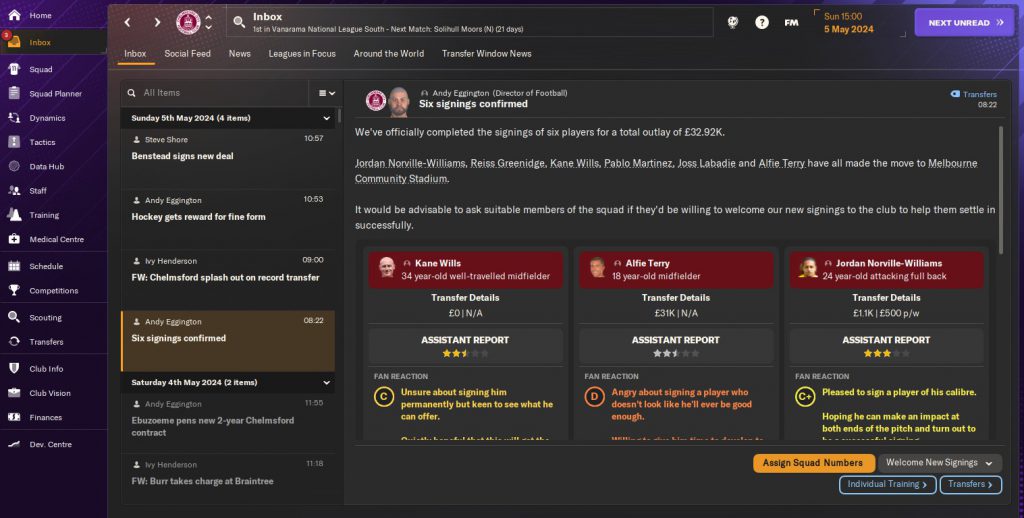
I think that it might be the changes to the transfer systems, which I’ll get to later; but, I also think it might be down to the AI sharpening up with how they adapt to tactics mid-match, and how they hunt down people that fit their formation rather than — I’m guessing — what they used to do which was just pivot formation if things got a bit conflated.
It doesn’t feel like a big smashing together of database numbers anymore, and it no longer feels like the old complaint (full speed and you’ll lose, slow it down and you’ll win) which saw some players simply touching every button, prompt and slider to show the game they’re paying attention. I’ve seen my team pull back from disaster through a few tiny tweaks here and there, and that’s not just being 3-0 down at half time, that’s having my poacher and right winger taken down by injury.
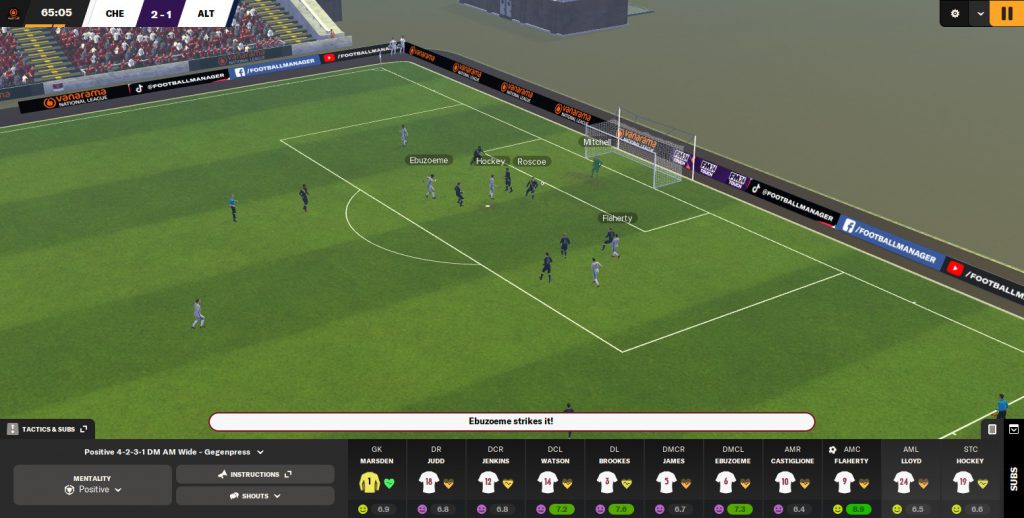
Some of this experimentation has also come as a result of the refined promise system. Somehow I stacked up a dozen or so promises after my first year, with lots of players requesting to be played in specific positions. Am I spending more time than ever in the tactics screen, setting custom position twists if my AM/self picks somebody for a position? Yes. Is that a bit tedious at times? Yes, especially if I reset a tactic and haven’t saved it in a while. Would it be great to have the option to “Apply specific Personalised Role Instructions to Player” from the promise screen? Yes. However, it has meant that I’ve explored more areas that’d normally be automated or ignored if that feature wasn’t there – and that’s improved my game experience.
Increased promises means increased hierarchy issues, which adds another wrinkle into the ointment. I’ve actively sacked off two vice-captains who had become less-useful, but bigger voices in the team. Faith in me, as a manager, was low due to me being fresh to the role — so, I couldn’t simply assert my way through the problems. This was incredibly memorable, and really changed how I viewed a lot of my players.

For other things that I felt changed massively: It seemed like a lot of my mid-game instructions (through assistant manager pop-ups) weren’t being taken on-board, the interview circuit seemed more interested in pitting me against other managers than normal, and the chair were surprisingly flexible when it came to budget for coaching courses — something that never normally happens in my experience of low-tier management.
The change in systems
As you’ve probably picked up on already, I’m likely not the standard Football Manager player. I suspect that a lot of players are hyper fans of lapsing legends like West Ham, Everton, Leeds, Portsmouth and other teams that have tickled the lower-half of leagues and perhaps tasted promotion more than they have silverware. That or power-players who just want to mop up a treble, or mess up a particularly tenacious rival. As such, I probably can’t comment on changes to the top levels of management, however there were — in addition to the stuff that I’ve already mentioned — a fair few changes to the game that rippled down to the lower tiers of English football.
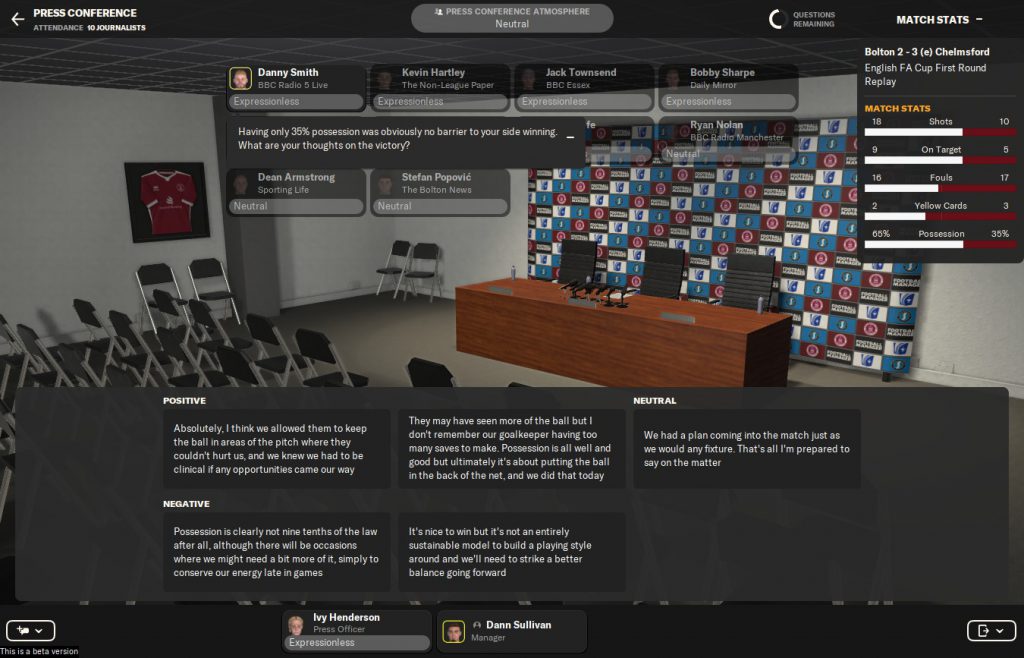
Scouting and transfers feel like they’ve been entirely shaken up as a result of improved manager AI and scout budgeting. It feels like a bit of a fight to get the ball rolling on scouts now, with background knowledge a lot lower (in my experience) and a lot more reliance on long-term scouting or extensive trials to get the ball rolling on a potential acquisition.
Of course, that potential acquisition now potentially comes involving an intermediary or agent pitching to you, or inserting themselves into the progress. There are a lot more names, and relationships, at play as a result.

There are some meta-features added in, the kind that most people will only use once or twice but completely define their gameplay experience. Namely, you can load in saves from your previous game, and there are three different database states that you can start from.
Loading in previous saves has always felt like something Sports Interactive were avoiding rather than they hadn’t gotten around to, so it’s great to see it in there. It also makes sense alongside the choice between ‘Original’, ‘Real World’ and ‘Your World’ starting points.

Is Football Manager 2024 the best Football Manager yet? Definitely. Is it a fight to dig out certain information, for instance, promises in the player screen? Yes. Could promises have assistant managers add personalised player roles for you? Yes. Could this list of tiny improvements to this immense database of millions upon millions of pieces of data go on for longer than I have in this entire review? Yes, but this year’s iteration has felt like it’s added glue to hold the pieces, and I can’t see myself putting it down anytime soon.
Football Manager 2024 is available on almost anything that moves now, through Netflix, PC, and the Touch version through Apple Arcade.
Comments are closed.